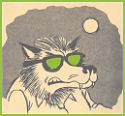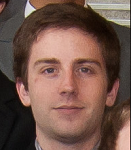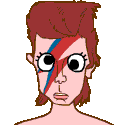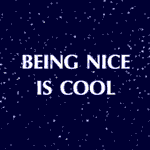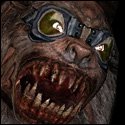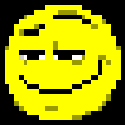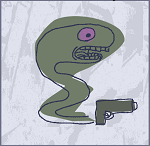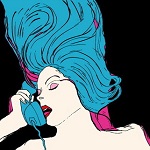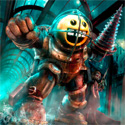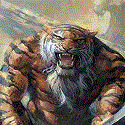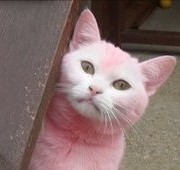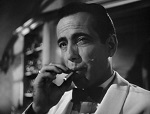|
Sun Harmonics posted:The most recent book I've completed is Molloy by Samuel Beckett, an Irish post-modernist. The book explores themes of mortality, of family and of illness in general, whether physical or mental. One thing I also enjoyed about this book is the fact that it explores the possibility of one of its narrators having fabricated most, if not all, of his contributions to the tale. And such a thought makes me think about how the integrity of a narrator affects the story she relays to me, and, I suppose, how much that should happen, if at all. Also: Beckett will make you appreciate longer sentences, because you will have to parse through a seemingly endless amount of them in order to get the true meaning of this book. Especially the first half, which is written from the perspective of a mentally disabled man. Very stream-of-consciousness, and very difficult to sift through without wholeheartedly diving into the novel. I love how weird Molloy is. The part with the sucking on pebbles was cracking me up.
|
|
|
|

|
| # ? Jun 5, 2024 14:58 |
|
ICHIBAHN posted:Funny you mentioned Console Wars now, I'm about a quarter of the way through it and yes, the conversations are really getting on my nerves. The thing that makes the book very intriguing is nostalgia, firstly, and that it's a very interesting period of video gaming. I think it'd make a brilliant tv series, then they could include decent made up conversations. Another thing that occurs to me, again a quarter of the way through, is that I don't want Sega to win. I'm pretty sure a documentary is being made for Console Wars- at least I had heard that at some point. I feel the video medium could possibly serve the storyline much better than the book format did. But then again, the Freakonomics documentary is one of the worst things I've seen in awhile... DannyTanner posted:I love how weird Molloy is. The part with the sucking on pebbles was cracking me up. Yes, I know, right? One particular review of the book on Goodreads made me laugh: quote:I had this book with me while at the beach. The beach was cold. It was mid-spring and it was New England. I stood and I looked at the sea. The sea looked grey.
|
|
|
|
As far as Console Wars goes, I dunno about a tv series but a movie has been discussed, featuring Seth Rogen.
|
|
|
|
Hopefully the movie/documentary is successful and they can release a new edition of the book without all the shite. I'd buy it a second time and reread it if it was just non-fiction without the cliche and unrealistic made up dialogue and drama. I.e. it would be good to read about the success of Street Fighter II for the SNES without all this poorly written guff about a barbecue with 'juicy burgers grilled to perfection' and some executive not wanting to swim in the pool.
|
|
|
|
Just finished a bit of science fiction: Ted Chiang's The Story of Your Life was excellent, a set of short stories that are actually decently written and aren't all about rayguns / world-building / lemme show you some physics and the usual cliches that SF authors indulge in. Admittedly some stories are better than others, but quality is high. (There's one that I found a bit hokey and irritating and it turns out to have been one of Chiang's earliest stories rewritten.) And you can sort of see his chosen devices and ways of putting together a plot. But hell, I enjoyed it. Good stuff. This was followed by the interesting contrast of Vernor Vinge's Across Realtime, which is a set of three novella all set in a future where a "Peace Authority" has taken over by "bobbling" (sealing into stasis) any resistance. I remember enjoying this when I read it years ago, but it seemed slightly clunky and old-fashioned this time. Vinge seems to change his mind about how bobbling works partway through the story, there's a sexy lady AI to help our hero, a sexy Asian superspy who's always right, the world is one in which university lecturers would seem to be the rebels and sort after experts ("he was the best algorithms man on the West coast"), the authoritarian bad guys are weak and helpless before our daring heroes, there's a real libertarian wet-dream in which a military invasion is turned back from "ungoverned" land by a farmer with nukes ... Maybe it's not aged well. Maybe it was always clunky and awkward and I was just younger.
|
|
|
|
Since January 1: John Darnielle - Wolf in White Van I liked the way he messed around with the timeline, and gave you just enough information about Trace Italian to make you interested in it without having to go through the trouble of really fleshing it out. I wonder if I would have liked it as much if I didn't like him as a person and musician though? Anyway, a good quick read. Amy Poehler - Yes Please More entertaining than the usual autobiography of a comedian and believe me because I've read a million of them. I gotta stop buying books like this though, I can't imagine ever reading them more than once. This book is what made me realize I need to be using my local library more this year. Brad Dukes - Reflections (an Oral History of Twin Peaks) I enjoyed this because I love oral histories and I love Twin Peaks. Obviously suffers a bit by not having much input from the bigger stars, or from Lynch himself, but still has good stories about the production issues and network interference and all of the other stuff you wouldn't really have the context of as someone watching it on Netflix in 2015. David Benioff - City of Thieves A really silly plot set in Leningrad during WWII (two young men are saved from execution, instead receiving a mission to go find a dozen eggs for some Russian Colonel's daughter's wedding cake). A quick read and pretty funny, I'd be interested in reading his other books. A friend recommended this to me and I didn't realize until yesterday that the author is one of the showrunners on Game of Thrones. Amy Stewart - Wicked Plants: The Weed That Killed Lincoln's Mother and Other Botanical Atrocities This was dumb as hell. I was hoping for some interesting facts about deadly plants, but instead it's like 2 pages on an interesting plant and then 67 more plants get covered with a paragraph each (usually saying the same thing, something along the lines of "if you eat enough of this you will get sick") and then 2 pages of a good plant again. A neat concept for a book but really not worth your time unless you like reading paragraph after paragraph of the same poo poo.
|
|
|
|
outlier posted:Maybe it was always clunky and awkward and I was just younger. Sadly, that's the feeling I get a lot of times when I revisit the old SF and other genre fiction I used to read.
|
|
|
|
ClearAirTurbulence posted:Sadly, that's the feeling I get a lot of times when I revisit the old SF and other genre fiction I used to read. I think sf is particularly vulnerable to that: flashy futures, the good smart guy defeats the dumb bad guys, a bit of sex and romance. It's like catnip for dorky young males.
|
|
|
|
Last book I finished was Tigerman by Nick Harkaway. Good plot, fascinating action scenes, interesting twist with the revelation of the child's name and parentage, but the ending was unsatisfying. Vague spoilers covering as little as possible, but I'll err on the side of caution. I was hoping for a happy ending, because this is a superhero story and Tigerman can save the boy, save the island, get the girl, and break a few more villain noses in the process. I'd even accept a compromised ending where things don't go entirely his way because this is not-entirely-unlike-the-real-world, and superheroes don't work out that well; maybe he can't adopt the kid because of some bureaucratic nonsense, or the island still gets erased because nobody listens to his report, or the girl turns him down because he's a nutter in fancy dress. But no, Tigerman overcomes all the obstacles, the (well-meaning) betrayal, the political opposition, he wins everything, and then it all goes south because of a drat anticlimactic accident. I can come up with a few lit crit explanations for that, like superheroism really doesn't work well in this world, or you can't always get what you want, or something about sacrifices and grand schemes not working out, but regardless, it doesn't sit well with me. And I'm still going to read his other book, because Goddamn that man can write.
|
|
|
|
Just finished the Old Kingdom trilogy (Sabriel, Lirael, and Abhorsen) by Garth Nix. Hot drat, those were great. Lirael is definitely a more interesting protagonist than Sabriel though. And what's up with Nix not having breaks in between character perspective? Weird.
|
|
|
|
The Berzerker posted:Amy Poehler - Yes Please At least three girls I've dated have read Tina Fey's autobiography at some point. I read a chapter, and it was not at all for me- I hope Poehler's is more enjoyable!
|
|
|
|
Sun Harmonics posted:At least three girls I've dated have read Tina Fey's autobiography at some point. I read a chapter, and it was not at all for me- I hope Poehler's is more enjoyable! It was to me, I've read both in the last couple of years. Tina's is a bit more biography, Amy's is funnier.
|
|
|
|
Armor by John Steakley. I was disappointed by this book mostly due to its use of split narrative. The intriguing premise set up by Felix in the beginning was completely miscarried by the following Jack Crow parts for me. Strangely enough, I found the dehumanized, stoic soldier far more interesting than the renowned space pirate. I think the problem is that Jack Crow is supposed to have an established reputation of a likable rogue, and other characters are aware of and react to this reputation, but nothing in the text really illustrates that charm. It often ignores the "show, don't tell maxim" of writing by taking silly shortcuts. For instance, Jack will just tell the audience that he somehow convincingly deflected questions as to why he is on Sanction through narration, but the book doesn't do the legwork of demonstrating his silver tongue. In fact, I found Jack's dialogue and overall personality banal and Steakley's attempts at repartee very painful to read, a criticism that extends to many of his other characters. As an answer to Heinlein's Starship Troopers, its most obvious progenitor, it goes more indepth into the military science fiction aspects. Despite being more action-y, I suppose it still an anti-war work, but I wouldn't put too fine a point on that claim since the flatness of its characters will often work against its theme and message.
|
|
|
|
moot the hopple posted:Armor by John Steakley. On rereads I find myself just skipping the Jack Crow parts of Armor.
|
|
|
|
outlier posted:I think sf is particularly vulnerable to that: flashy futures, the good smart guy defeats the dumb bad guys, a bit of sex and romance. It's like catnip for dorky young males. I've also realized a lot of it was libertarian propaganda. I blame my SF fandom in my teenage and 20-something years for my libertarian phase. When I read "The Forge of God" recently I was put off by a couple of lines attacking Marxism and Marxists that came out of nowhere and seemed really out of place, like their only purpose was to establish firmly that the protagonists Did Not Like Socialism. There were also references to a former President who had cut domestic spending and increased spending on the space program and was assassinated in Mexico City, who was replaced by a more mainstream Vice-President who turns out to be a really bad President. I read "Armor" years ago and though my memories are a little vague I do remember liking the soldier chapters much more than that other guy. It was uneven but seemed well written to me at the time.
|
|
|
|
SF is about the only genre where libertarianism persistently and explicitly shows up. Don't know why: maybe it goes with the slightly undertone of fascism that often underlies SF. On to "Armour", it's a strange book. It has such a reputation and so many people have read it, but it's not actually well written.
|
|
|
|
outlier posted:SF is about the only genre where libertarianism persistently and explicitly shows up. Don't know why: maybe it goes with the slightly undertone of fascism that often underlies SF. A lot of it was written when Communism had a personified enemy and most of the writers are white men.
|
|
|
|
computer parts posted:A lot of it was written when Communism had a personified enemy and most of the writers are white men. Yeah, this. The old-school 50s and 60s stuff with a libertarian streak like The Moon is a Harsh Mistress was libertarianism through the lens of anti-Marxism/cold war Communism. The newer stuff that is more libertarianism through the lens of red vs. blue politics is mostly white guys who spent their formative years reading Heinlein in the basement while avoiding bullies. The Moon is a Harsh Mistress is actually a pretty great book btw
|
|
|
|
i just finished The Getaway by Jim Thompson, holy poo poo that ending.
|
|
|
|
I just finished The Doubt Factory, a young-adult conspiracy thriller by Paolo Bacigalupi. He wrote Shipbreaker and Drowned Cities, a couple of YA books I think are pretty amazing, with characters, world-building, and pacing that transcend any negative connotation the term "YA" might bring up. He also wrote The Windup Girl, which I think is one of the best, most stunningly unique, most "this could actually happen" sci-fi books of the past 5-10 years. So I was really looking forward to reading his latest. I saw his name on the cover and plopped down the cash on the counter without a second guess. So of course, The Doubt Factory was a pretty big letdown. Flat, uninteresting characters. Built around paranoia and conspiracy but you never, ever second guess who's truly good or bad. Twists are mundane, and the ending is a complete cop-out. Certain aspects of it were alright - the climax almost reached "exciting" - but there's nothing here that hasn't been done before. Now I'm all sad and my excitement level for his next book - The Water Knife - went from "hell yes first day purchase" to "I'll read the reviews first this time".
|
|
|
|
|
Just finished Station 11 by Emily St. John Mandel. It was decent, and fairly unique as post-apocalyptic stories go, but I was pretty bothered by the amateur-feeling quality of the writing and the lack of imagination in much of the setting. It didn't do a great job at making me care about any of the characters, either. I feel that there was a lot of unrealized potential that could have made it a much more interesting story.
|
|
|
|
Just took my first dip in to the ocean that is Terry Pratchett and read Guards! Guards! and god what an entertaining book. I absolutely love his style of writing in it and I love Vimes as a character. I don't think I've smiled as much while taking in any kind of story (book, film, video game) as I have with this book. Now to completely kill that lighthearted feeling, I'm going to start reading Metro: 2033 by Dmitry Glukhovsky, because the game is amazing and I hear the book is as well, if very bleak at points.
|
|
|
|
HnK416 posted:Just took my first dip in to the ocean that is Terry Pratchett and read Guards! Guards! and god what an entertaining book. I absolutely love his style of writing in it and I love Vimes as a character. I don't think I've smiled as much while taking in any kind of story (book, film, video game) as I have with this book. Awesome! Just 39 more main sequence novels left plus all the tie in books   Have fun!
|
|
|
|
Finished Dreams and Shadows by C. Robert Cargill, who's mainly a screenwriter (he's behind the Sinister movie). I found the book on a big sale at Chapters and it sounded kind of cool. It's an urban fantasy-esque story, sort of Neil Gaiman-esque, but not as deep nor as mature. Overall, not a bad book. I was surprised to learn that all the fae beings mentioned in the book (e.g. changelings, Leanan Sidhe, redcaps) are actual creatures from human mythology, and the descriptions and behaviours described in the book are very accurate to legends and myths. I thought that was integrated very well. The book had some creepy moments, but it never really hit dead-on scary.
|
|
|
|
The Peripheral, the new novel by William Gibson. I read the first 3/4 of this in short 15-30 page bursts, which in hindsight was probably a bad idea. The plot felt really dense and I got confused as to which characters were which and other pretty silly issues. However, once everything started coming together, once the two timelines start to make sense in relation to each other and the bigger picture was revealed, I was pretty hooked. The near- and further-future tech Gibson describes is both worryingly and intriguingly plausible, and while a lot of the tone seems downbeat (especially with regard to the "jackpot"), I found myself cautiously optimistic by the end. I think I'll need to read this again sometime to fully appreciate it now that I know all the details. Slaughterhouse 5, by Kurt Vonnegut. I had only vague memories of half-reading this at school, and I'm still kind of kicking myself for not revisiting it sooner. It's absolutely excellent, equal parts hilarious, insightful and crushing. There's not really anything I can say about this book that hasn't been said before, but I do love and appreciate Vonnegut's expert narrative use of farts. We Should All Be Feminists, by Chimamanda Ngozi Adichie. Transcribed from her TEDxEuston talk from a couple of years ago, it's a short and impassioned discussion of gender roles and her own experiences growing up and living as a woman, specifically in Nigeria. It's pretty standard, unsurprising stuff to anyone well-versed in the topic, but she has a great way with words. It's the kind of book I'd want to leave somewhere for an impressionable teenager to pick up and read.
|
|
|
|
HnK416 posted:Just took my first dip in to the ocean that is Terry Pratchett and read Guards! Guards! and god what an entertaining book. I absolutely love his style of writing in it and I love Vimes as a character. I don't think I've smiled as much while taking in any kind of story (book, film, video game) as I have with this book. Terry Pratchett has a fantastic writing style - I've never been disappointed by one of his books, especially the city watch ones. I've just finished The Guns of the South, by Harry Turtledove. It's an alternate history book (plus some time travel) that takes place during/after the American Civil War. The southern states gain access to modern rifles and ammunition and are able to successfully secede. They then have to deal with both the new issues resulting from the war, as well as the people who provided the weapons. I've never read any alternate history books before but I enjoyed it. I liked the "what-if" scenarios; I just wish I knew more about the civil war (especially the leading individuals) to know how accurately Turtledove portrayed them. But Guns of the South was good enough that I've picked up his The Great War: American Front to read next, and encouraged me to look for more from the alternate history genre.
|
|
|
|
The Berzerker posted:Since January 1: I've only ever been a super-casual fan of Mountain Goats (though I've been rectifying that after reading this book), so I didn't feel any bias going into this book. It was really good; probably one of the most engaging books I've read in years. Genuinely smart and interesting. I've read the argument that "nothing actually happens" in the book, but that's kind of missing the point. I really hope that he writes some more.
|
|
|
|
Working my way through the Thraxas series. The cover art makes him look like a fat Stephen Colbert, so that's interesting. The novels (so far) are pretty good. Started the 3rd this morning.
|
|
|
|
Finished the first book of the french author Fred Vargas's Commissaire Adamsberg series, The Chalk Circle Man. It's easily one of the strangest, dreamiest mystery novels I've ever read and yet it was surprisingly fascinating. I can see why this is apparently a huge hit series in France. The pov switches mostly between the main character, the Titular Commissaire Adamsberg, and his 'Watson', so to speak, another police officer named Danglard. Adamsberg is.. bizzare. I'd almost say he's autistic but that doesn't quite fit either. He has strange, meandering, rambling chains of thought and conversations, spends half the day doodling, even in the middle of conversations, does poo poo on impulse, and obsesses on random, bizzare details that just 'bother' him but he's completely unable to describe adequately, even to himself, why or how they matter. And yet, his bizzare mentality has lead him to solve a large number of high profile crimes, which has made him something of a minor celebrity, the attention of which rather bothers him. Danglard, funnily enough, is the logical, smart, analytic sort of person who is probably actually smarter than Adamsberg in the traditional sense, but sort of ends up following him around because his bizzare behavior and way of speaking and thinking is so interesting to him, and strangely relaxing. A big part of the appeal of the book is just watching these two characters marvel at the strange thought processes of the other. One interesting thing the author does is write in an almost chain of thought style manner - you see a lot of the impulses and stupid thoughts that sometimes pop into your head and are promptly ignored, something it doesn't feel like I've really seen in many books before. The rest of the cast of this mystery, since it's a whodunit of sorts, are all almost just as strange and interesting characters, and the meat of the book is watching all the characters interact. The mystery itself was interesting too, with a rather bizzare killer, but it was the characters that got me. Sadly, I've heard that the translation for book 2 is rather terrible compared to book 1, and that it's a lot less fun of a read since a bad translation can kill the whole dreamy charm of the book. Wolpertinger fucked around with this message at 00:03 on Jan 24, 2015 |
|
|
|
Xzov posted:I've never read any alternate history books before but I enjoyed it. I liked the "what-if" scenarios; I just wish I knew more about the civil war (especially the leading individuals) to know how accurately Turtledove portrayed them. But Guns of the South was good enough that I've picked up his The Great War: American Front to read next, and encouraged me to look for more from the alternate history genre. I wouldn't have done that. The Great War and its two sequel series are literally just the two World Wars and the period between transplanted to the US with the South as Germany and the North as the Allies. If you want to read more Turtledove alt-history go for the Worldwar/Colonization series, which is "What would have happened if an alien conquest fleet had shown up in 1942?", and The Two Georges, a standalone novel set in a 1980s where the Revolutionary War never happened.
|
|
|
|
I just finished War and Peace by Tue one and only Leo Tolstoy. I started it when it was the book of the month in, oh... September 2012? It wasn't bad, just dense. I enjoyed the narrative, but the 20 page history lesson digressions made me put it down for months at a time. I skimmed the last 50 pages something fierce. When the narrative ended and the rest was more history and philosophy, I didnt care anymore. I love his ridiculous metaphors though. 3 pages to explain why post- evacuation is like a dying beehive was bizaar
|
|
|
|
I just finished Chris Taylor's How Star Wars Conquered the Universe. I love reading making-of books about movies and movie franchises, and this was honestly the best example I've seen of such a thing. The book was a pleasingly comprehensive exploration of the entire Star Wars franchise and phenomenon, from the first scribblings of a teenage George Lucas, all the way through his entire career, up to (and beyond) the sale of Lucasfilm to Disney. It covers so much: the writing, making and marketing of the films; the early scripts and treatments that are almost unrecognisable as the final stories put to film; the Expanded Universe of books, TV shows, and comics; the endless merchandising; the critical and commercial response; and most importantly, the origins and expansion of the fandom to its present and enormous size. It's mostly a chronological telling, although every so often there'll be a whole chapter acting as a present-day aside, where Chris Taylor profiles various groups and individuals of note within the fandom (cosplayers, collectors, and so on). The first chapter, before the history begins, is a strangely touching account of the effort to translate Star Wars into the Navajo language (the first film ever to be released in that language!). Taylor packed so much history and analysis into this book, and it never stopped being gripping and readable. There's tons of highs and lows. The history of Lucasfilm is told with plenty of warts. Taylor has done a ton of research for this book, including scores of new interviews with everyone conceivably connected to the franchise and fandom. There's tidbits in here that Lucasfilm would never admit to or acknowledge. George Lucas himself isn't idolised in the book; he's painted mostly as sort of a sympathetic character who was never happy with his work and watched it get carried away from him by fandom and hype, but his petulance as a film-maker and ruthlessness as a businessman is also touched upon. The fandom itself is shown to be a very complex organism, at times a rather demanding and cruel group, who don't exactly harbour a lot of love for the so-called Creator, and at other times a vibrant community filled with kindness and good spirit. I tore through this book, constantly fascinated by the stories within. I say this, and I'm not even a huge Star Wars fan: I enjoy the original trilogy and I tolerate the prequels, but I've never seen any of the cartoons or read any of the Expanded Universe material. But I have to say this book has changed my outlook. It's gotten me excited about Star Wars again. I'm going to go watch all the movies again. I'm going to read the JW Rinzler "Making Of" books (if there's anything Taylor's book is light on it's stories from the film sets, but Rinzler's enormous and in-depth books already exist, so I don't think this book needed more of that). I'm going to look into a few of the novels. And I'm most certainly going to get very hyped up about Episode VII. Hedrigall fucked around with this message at 04:10 on Jan 24, 2015 |
|
|
|
Jedit posted:I wouldn't have done that. The Great War and its two sequel series are literally just the two World Wars and the period between transplanted to the US with the South as Germany and the North as the Allies. If you want to read more Turtledove alt-history go for the Worldwar/Colonization series, which is "What would have happened if an alien conquest fleet had shown up in 1942?", and The Two Georges, a standalone novel set in a 1980s where the Revolutionary War never happened. Well that's disappointing to hear. I was hoping that the Great War series would be like Guns of the South, but delving even further into the scenario since there's three books. I'll have to track down The Two Georges and the first Worldwar book then.
|
|
|
|
Just spent the last 24 hours devouring Random Acts of Sensless Violence by Jack Womack. Talk about getting sucked in, dragged along and spat out. I don't know how popular or well known it is so I don't know how redundant explaining the premise is but it's a dark, pre-apocalyptic coming of age story told via the diary entries of a twelve year old girl. I liked the use of the dialogue she writes slowly, gradually changing as the months pass to reflect how a crumbling world is changing her and everyone around her. I've absolutely no idea how authentic the gangster dialogue is or was for its time, so I went ahead and assumed that it was because that meant I enjoyed the book more (maybe it was all totally made-up, which is cool as well but I don't think I need to know either way). The other advantage I felt the book had was that having a first-person 12 year old perspective gave it a great reason not to get bogged down with nitty-gritty info-dumps such as how the economic and political situation got so bad (and let's face it we only have to turn on the real news to work that out). She occasionally gives passing mention to what she sees on the news, or things her parents or teachers say, and we can put our own adult inferences on those, but it's first and foremost a great character piece that I thoroughly enjoyed getting into the head of.
|
|
|
|
Neil Gaiman - Ocean At The End Of The Lane. I'm not a huge fan of Graveyard Book or Coraline, but I really liked Ocean. It's almost as if Gaiman's previous childhood themed novels were drafts of sorts for this one. It's much more focused and better paced and it feels that, while the author is fascinated by childhood, he's not infatuated with it. Being a kid is really frustrating and Ocean At The End Of The Lane is well aware of it, among other things. Highly recommended.
|
|
|
|
Jedit posted:I wouldn't have done that. The Great War and its two sequel series are literally just the two World Wars and the period between transplanted to the US with the South as Germany and the North as the Allies. If you want to read more Turtledove alt-history go for the Worldwar/Colonization series, which is "What would have happened if an alien conquest fleet had shown up in 1942?", and The Two Georges, a standalone novel set in a 1980s where the Revolutionary War never happened. Other good Turtledove books: Between the Rivers, about a fantasy Mesopotamia where the city states are ruled in person by physically real gods. A Different Flesh, an anthology in which the Americas weren't populated by Homo Sapiens, but by Homo Erectus; and all the megafauna was still present when Europeans arrived. also this: "Clash of Arms," starts at about 30 minutes. An expert on coats of arms meets a man who thinks he can stump him. http://www.starshipsofa.com/blog/2013/07/30/starshipsofa-no-300-harry-turtledove/
|
|
|
|
Finished The Disaster Artist by Greg Sestero and Tom Bissell. It is Greg's memoir of filming "The Room" and his experiences with Tommy Wiseau. I'm not really into the "cult of The Room", as the author calls it, but it was still a pretty interesting and at times hilarious read. Tommy Wiseau is a pretty interesting person as well and the mystery of his life kept me turning pages. It's short as well, I finished it in two days, check it out if you have any interest in "The Room" for sure.
|
|
|
|
Yup, loved that book. Very entertaining and easy read.
|
|
|
|
The Truth Is A Cave In The Black Mountains, by Neil Gaiman. A lovely little short story that reads like an old legend. Gaiman's "storyteller" voice lends itself well to a tale of two men travelling across Skye (in northwest Scotland) to a fabled cave said to be full of riches. It's a dark and engrossing ride, and while the book is fully illustrated (by Eddie Campbell), a lot of the smaller pictures (comic panels of the main two characters) were distractingly sketchy. The fact that these pictures were digitally painted/sketched made it a little more jarring, but didn't really take away from the story proper. Discovering Scarfolk, by Richard Littler. A surprisingly dense book based on the excellent Scarfolk Council blog, a collection of artefacts from a mysterious British 70s dystopia. The book collects a large number of the material from the site (really spot-on 70s-style paraphernalia that at first glance could be authentic) and uses it as supplemental illustration for a weird, funny and creepy story about a man who lost his children, and his mind, in Scarfolk. It's a book best read in small doses, as the style can start to get a little old after too long, and sometimes the creepy-silly balance misses the mark. This is still a lot of fun, though, and a pleasant surprise given that I thought it'd just be a print collection of material from the blog.
|
|
|
|

|
| # ? Jun 5, 2024 14:58 |
|
I finished Pandora's Star last night when I should have been sleeping. I enjoyed it, though I thought it moved just a tad slow at times, specifically any part with Mark and Liz as I just don't really understand what they are there for yet, and it wasn't really made clear. I also enjoyed all the parts with Ozzie and he's a pretty cool dude.
|
|
|







